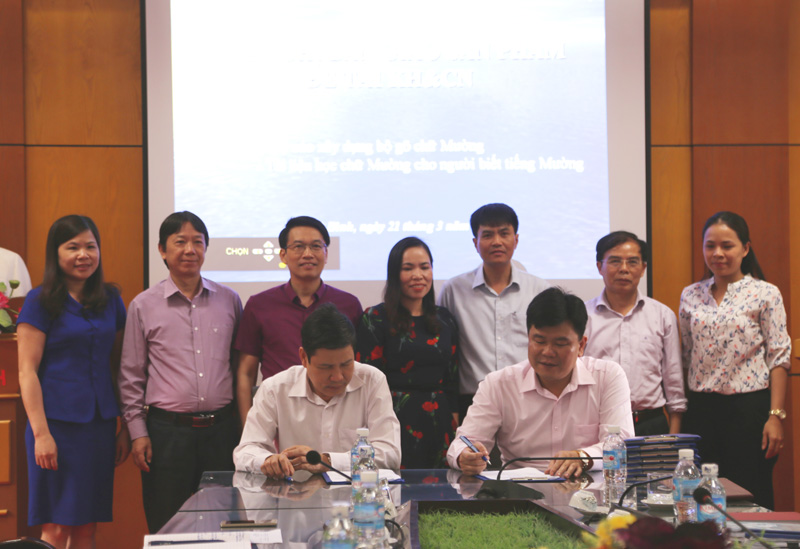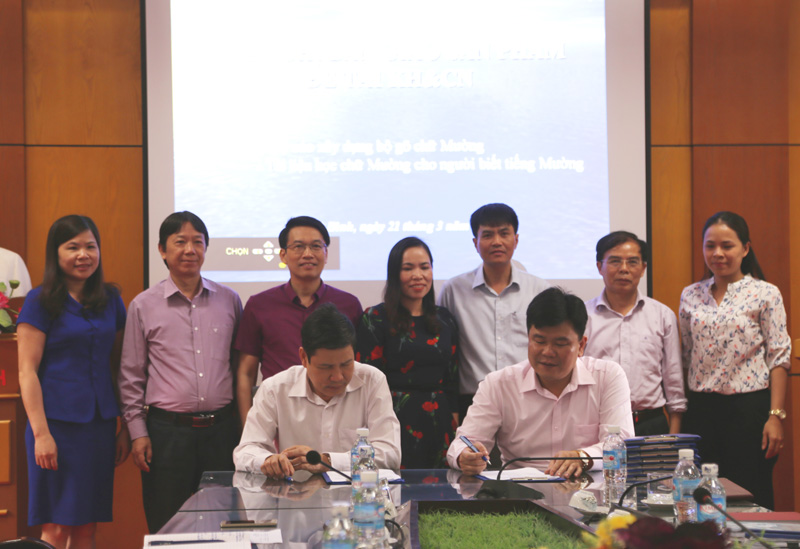
(HBO) – The communication and education board of the Hoa Binh provincial Party Committee and the provincial Department of Science and Technology held a meeting on March 21 to hand over the input method editor (IME) and teaching documentation of the Muong ethnic language.
The event was attended by
officials of the provincial Department of Culture, Sports and Tourism,
Department of Education and Training, and Department of Information and
Communications, along with representatives of Hoa Binh Newspaper, Hoa Binh
Radio-TV Station, and the province’s school of politics.

The communication and education board of the
provincial Party Committee and the Department of Science and Technology hand
over the Muong language IME and teaching documentation.
To implement the provincial People’s Committee’s
Plan No. 118/KH-UBND, issued on October 27, 2016, on the application the Muong
alphabet in Hoa Binh, in early 2017, the Party Committee’s communication and
education board proposed the Department of Science and Technology implement a
project on building the IME and teaching-learning documentation of the Muong
language.
The project aims to popularise and apply the
Muong alphabet in the life of local Muong ethnics. It is also meant to affirm
that the Muong alphabet is the official script of the Muong in Hoa Binh and
help preserve the ethnic group’s cultural values.
The communication and education board
coordinated with the Institute of Linguistics and scientists to carry out the
project. The IME passed the final examination in December 2017. Meanwhile, the
compilation of the Muong language teaching and learning documentation,
featuring 10 lessons, was also completed.
The Muong alphabet is based on the Vietnamese
language. Therefore, the teaching and learning documentation only focuses on
the differences between the two alphabets, reflecting the identities of the
Muong language and ensure the consistency in writing.
To apply the Muong script, Hoa Binh Newspaper
has been piloting the Muong version on its website.
At the meeting, participants suggested the
Department of Science and Technology advise the provincial People’s Committee
to launch synchronous relevant tasks. Meanwhile, Hoa Binh Newspaper, Hoa Binh
Radio-TV Station, the Department of Education and Training, and the province’s
school of politics should build plans to popularise and apply the Muong
language in reality./.
With an increasingly vibrant and widespread emulation movement aimed at building cultured residential areas and cultured families, Yen Thuy District has been making steady progress toward improving both the material and spiritual well-being of its people, while fostering a civilized, prosperous, beautiful, and progressive community.
Once lacking recreational spaces and community facilities, Residential Group 2 in Quynh Lam Ward (Hoa Binh City) has recently received attention for the construction of a new, spacious, and fully equipped cultural house. The project followed the model of state support combined with public contributions in both labor and funding.
The "All people unite to build cultural life" movement, which has been effectively integrated with Kim Boi district’s socio-economic development goals, is fostering a lively spirit of emulation across local residential areas, hamlets, villages, public agencies, and enterprises. In addition, through the initiative, traditional cultural values are being preserved and promoted, while community solidarity and mutual support in poverty reduction and economic development are being strengthened.
A working delegation of the Hoa Binh provincial People’s Committee led by its Permanent Vice Chairman Nguyen Van Toan on June 11 inspected the progress of a project to build the Mo Muong Cultural Heritage Conservation Space linked to tourism services in Hop Phong commune, Cao Phong district.
Born and growing in the heroic land of Muong Dong, Dinh Thi Kieu Dung, a resident in Bo town of Kim Boi district, in her childhood was nurtured by the sweet lullabies of her grandmother and mother. These melodies deeply imprinted on her soul, becoming an inseparable part of her love for her ethnic group's culture. For over 20 years, this love for her hometown has driven Dung to research, collect, and pass down the cultural values of the Muong people to future generations.
In the final days of May, the Ethnic Art Troupe of Hoa Binh Province organized performances to serve the people in remote, mountainous, and particularly disadvantaged areas within the province. These were not just ordinary artistic shows, but they were the meaningful journeys aimed at spreading cultural values, enhancing the spiritual life of the people and contributing to the preservation of ethnic minority cultural identities.



